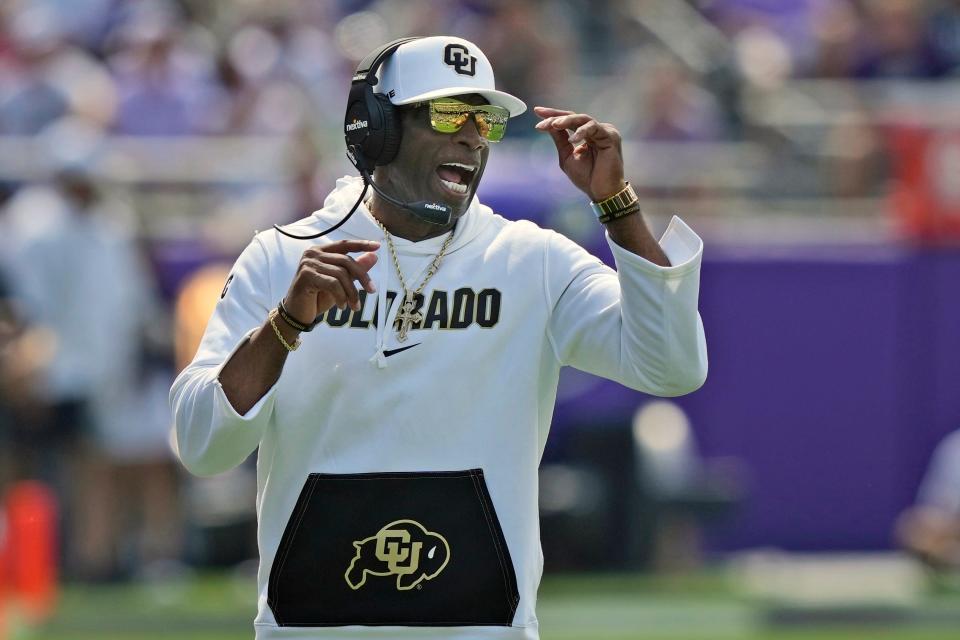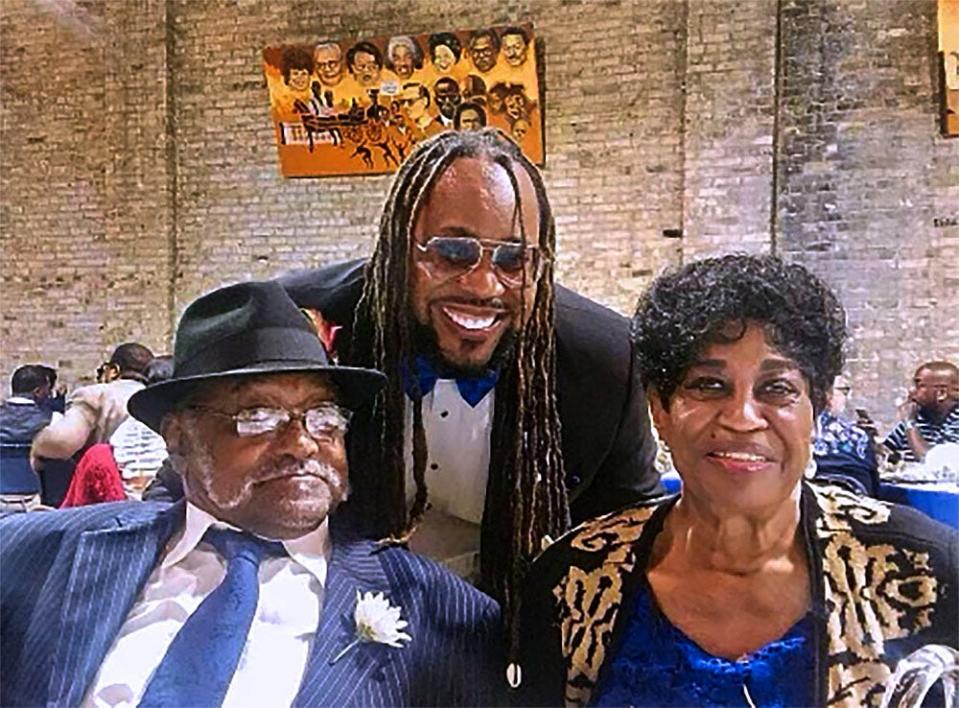Deion Sanders video surfaces just in time for suicide prevention month
- Oops!Something went wrong.Please try again later.
If you or someone you know may be struggling with suicidal thoughts, you can call the 988 Suicide and Crisis Lifeline any time day or night, or chat online. The Crisis Text Line also provides free, 24/7, confidential support via text message to people in crisis when they dial 741741.
Deion Sanders is back in the news and it’s got nothing to do with football.
Sanders, if the name doesn’t immediately register, is one of the best athletes of the modern era. He’s the only person to have played in both the Super Bowl and World Series, and was so dominant that he earned the nickname “Prime Time” because of his ability to come up with a big play. He’s now head football coach at the University of Colorado.
But a two-year old video resurfaced again where he spoke about how at the peak of his celebrity and athletic dominance, he felt broken inside. The only way he thought he could end that pain was by taking his life. So he drove his car off an embankment. The video recently resurfaced in time for National Suicide Prevention Month.
“I had everything. Every time I turned on the TV, I was on every commercial. I was playing two sports at the top of my game, and I tried to take myself out in Cincinnati,” Sanders said in the video.
He didn’t succeed and dedicated his life to the Lord. His admission many years later, and the discussion it sparked is a conversation we need to have, especially with our kids. We must elevate the subject in the hopes of decreasing the numbers. I know that from my own mental health struggles after I lost both of my parents within six months of each other.

Suicides a national emergency for every race, every age-group
Death by suicide is a complex problem related to multiple risk factors such as relationships, job or school, financial issues, mental illness, substance use, social isolation, trauma, barriers to health care, and easy access to lethal means. The statistics are so alarming that the Centers for Disease Control and Prevention have described it as a national emergency. Consider, for example:
Suicide is the 11th leading cause of death in the U.S.
Middle-aged white men have the highest rates, and in 2021, men died by suicide nearly four times more than women.
In 2020, it was the leading cause of death for Black girls aged 12 to 14.
Firearms accounted for 55% of all deaths by suicide.
94% of adults say it can be prevented.
The last statistic is why it's so important that people like Sanders speak out. To address the stigma of suicide, more survivors must come forward and share their stories. Breaking down the mental health stigma is the best way to address the issue and save lives. That's why I shared my own story last year.

Dozens reached out after I shared my struggles with mental health
I have struggled mentally since I lost both of my parents. I didn’t want to live. I lost my father to pancreatic cancer on Oct. 28, 2018, and my mother to soft cell carcinoma on May 3, 2019. As an only child, it was the hardest thing that I’ve ever gone through in my life. It was tough enough losing my father and even tougher losing my mother just six months later.
I was in an unimaginable pain that I still cannot describe. Crying didn’t help. Being angry didn’t help. Praying didn’t help. I could not stop hurting, and I felt alone.
My wife never left my side because she knew I wasn’t right. Secretly, I wrote a note explaining why I chose to end my life and apologizing to my wife, daughter, and network of friends. One day, my wife left the house to check on her parents. Before she left, she told me she would only be gone an hour.
I remember her going to the car and backing out of the driveway. I watched from the window as she drove down the block, and I went to get my gun, which I kept under the dresser for home protection.
It wasn’t there.
She’d taken it.
Weeks later I asked her if she hid my gun and she told me she did because she didn't like how I was acting and that simple act of love by her saved my life.
My column caused dozens of people to write and email me and thank me for my honesty. Several of them had tried to take their lives as well. One woman told me she attempted to take her life on at least three different occasions. She is currently in therapy.
Today, I talk about my ordeal openly because I want others to know that you can always talk to someone.
I've talked with several of my friends, and I was surprised at how many have actually had similar thoughts.
I have told my daughter that she can talk to me or her mother or anyone in the family whom she feels comfortable with about anything related to mental health or feeling down.
Having those conversations with your kids is especially important since they face the normal ups and downs of youth coming out of the COVID-19 pandemic that was particularly hard on their mental health and development.
Learning the warning signs can help save a life
The latest annual report from the Wisconsin Office of Children's Mental Health shows the state's youth are struggling with alarming rates of anxiety, depression, self-harm and suicidal ideation with limited means to access mental health care.
Dr. Kweku Ramel Smith, a Black licensed psychologist and president of Blaquesmith Psychological Consultative Services, said that although mental health resources are limited in disadvantaged communities’, conversations around suicide do not need to be taboo and should be held often.
With suicides being the leading cause of death for African American youth ages 15-24, Smith said more conversations must be held whenever there is an opportunity to discuss it.
“I’ve talked to parents who have lost their child to suicide, and they say, ‘Why didn’t they talk to me,’” Smith said.
The kid usually doesn’t talk about their dark thoughts because they don’t want to disappoint their parents, or they don’t want to be considered weak.
Smith said the "signs can be anybody, anytime, anywhere," including drastic changes in behavior; withdrawing from friends; taking unnecessary and dangerous risks; severe mood swings; self isolation; major changes in their eating and sleeping behaviors; abusing drugs or alcohol; and talking about wanting to die or being a burden to others.
Smith also advised people to check on their "strong" friends and family members, too.
"We need to check on the person laughing and the person making you laugh. At the end of the day everyone who deals with trauma, hurt and pain is a candidate for suicide," he said.
Smith called suicide a permanent solution for a temporary problem. When resources seem outweighed by the problem, it can seem like an option for even the strongest of people.
"We have seen it in billionaires, in athletes and in entertainers, so there is no demographic that can avoid this possibility," he said.
More frank conversation are needed with friends, family
While Sanders' confession is as public as it is powerful, more discussions must happen within our own communities, families, and circle of friends.
Sanders being open about his suicide attempt opens the doors for more of us to have these conversations. You don’t want to ever be on the other side saying, why didn’t they tell me they were in pain? Create an environment where those conversations can be had and remember to check on your friends and family.
It's a conversation we all need to have with our friends and family.
Reach James E. Causey at jcausey@jrn.com; follow him on Twitter @jecausey.
Resources
AMERICAN FOUNDATION FOR SUICIDE PREVENTION (ASFP). IMPACT 2-1-1
Gena Orlando, area director, Wisconsin
Email: gorlando@afsp.org
Phone: (414) 216-4180
Website: https://afsp.org/chapter/wisconsin
IMPACT 211 provides help for people during times of personal crisis. Help is available by simply calling 211.
Address: 6737 W. Washington St., Suite 2225, Milwaukee, WI 53214
Phone: (414) 302-6621
NATIONAL SUICIDE PREVENTION LIFELINE
Phone: Dial 988 or 1-800-273-TALK (8255)
Crisis Text Line: (text HOME to 741741) connect with a counselor at suicidepreventionlifeline.org/chat/
PREVENT SUICIDE GREATER MILWAUKEE
1300 N. Jackson St., Milwaukee, WI 53202
Phone: (414) 390-5800
Email: info@preventsuicidemke.com
Website:www.preventsuicidemke.com
VETERAN’S ADMINISTRATION – (ONLY SERVES VETS)
Address: 5000 W National Ave., Milwaukee, WI 53295
Sara O'Hara, suicide prevention coordinator
Phone: 414-384-2000, ext. 44939
Website: https://www.va.gov/milwaukee-health-care/health-services/suicide-prevention/
This article originally appeared on Milwaukee Journal Sentinel: Focus on mental health, open conversations for suicide prevention month.

